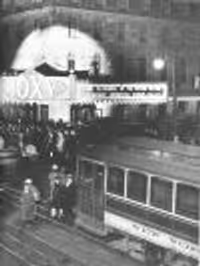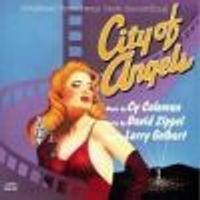GODSPELL Tickets are ALL $125 And There Are No Discounts? I Mean...Really?
#1GODSPELL Tickets are ALL $125 And There Are No Discounts? I Mean...Really?
Posted: 7/11/11 at 2:59pmREALLY?
iluvtheatertrash
Broadway Legend Joined: 11/9/04
#2GODSPELL Tickets are ALL $125 And There Are No Discounts? I Mean...Really?
Posted: 7/11/11 at 3:02pmVery high hopes. If everyone's smart, they'll wait to buy their tickets. I predict some $45 discounts.
#2GODSPELL Tickets are ALL $125 And There Are No Discounts? I Mean...Really?
Posted: 7/11/11 at 3:02pmI've never been in Circle in the Square - are there seats that deserve to be lower-priced (apart from common sense)?
#3GODSPELL Tickets are ALL $125 And There Are No Discounts? I Mean...Really?
Posted: 7/11/11 at 3:11pmWhy would they put out a discount right when tickets go on sale? I can't imagine there won't be one eventually, but any smart producer is going to wait for all the early-buyers to purchase at full price first.
#4GODSPELL Tickets are ALL $125 And There Are No Discounts? I Mean...Really?
Posted: 7/11/11 at 3:23pmHaving one price for all tix makes sense in that theater, where there really isn't a bad seat. A discount is almost certain to follow.
whatever2
Broadway Legend Joined: 8/25/06
#5GODSPELL Tickets are ALL $125 And There Are No Discounts? I Mean...Really?
Posted: 7/11/11 at 3:26pmI guess god really does like rich people better ...
Phyllis Rogers Stone
Broadway Legend Joined: 9/16/07
#6GODSPELL Tickets are ALL $125 And There Are No Discounts? I Mean...Really?
Posted: 7/11/11 at 3:28pmYou could probably road trip to see a community theatre production for less than $125.
thismyshow
Broadway Star Joined: 2/21/11
#7GODSPELL Tickets are ALL $125 And There Are No Discounts? I Mean...Really?
Posted: 7/11/11 at 4:39pm
Things to keep in mind:
1) cheaper then some other musical
2) much smaller theater
3) Also recent shows in that theaters initial ticket price have been 125 (including Lombardi)
Luv2goToShows
Broadway Star Joined: 9/13/09
#8GODSPELL Tickets are ALL $125 And There Are No Discounts? I Mean...Really?
Posted: 7/11/11 at 4:40pm
Oh Dear Lord
lightguy06222
Broadway Legend Joined: 12/3/06
#9GODSPELL Tickets are ALL $125 And There Are No Discounts? I Mean...Really?
Posted: 7/11/11 at 5:17pm
theatre guy is correct. The show doesnt open for 4 months! Why offer cheap seats now??
Cheap seats come later... like when they have 4 weeks until opening, and still have small houses.
There will be alot of great ticket prices and availability. Davenport knows what he is doing.
#10GODSPELL Tickets are ALL $125 And There Are No Discounts? I Mean...Really?
Posted: 7/11/11 at 6:01pm
Maybe the Vatican gets a cut
Seriously. I always thought it a mildly entertaining show.$ 125 aint mildly entertaining.
#11GODSPELL Tickets are ALL $125 And There Are No Discounts? I Mean...Really?
Posted: 7/11/11 at 6:26pmDiscounts are almost always offered before a show starts previews and during that period to sell seats and build word of mouth. I can't see GODSPELL being the hottest ticket in town right away and selling out so thats why I'm surprised a code has yet to be issued.
#12GODSPELL Tickets are ALL $125 And There Are No Discounts? I Mean...Really?
Posted: 7/11/11 at 6:49pmBut tickets JUST went on sale to everyone (earlier was only an Amex pre-sale). And previews don't start until October. I'm sure there will be good discount offers out there in the next 4-6 weeks.
#13GODSPELL Tickets are ALL $125 And There Are No Discounts? I Mean...Really?
Posted: 7/11/11 at 6:59pm
Since he seems to enjoy doing so, I'm a little surprised an innovator like Davenport isn't bucking the trend and doing what so many producers wish they could do: pricing that STARTS lower and moves higher -- in other words, rewarding the early adopter and penalizing the person who sits around waiting for a discount.
Now I'm not naive. I know the marketplace doesn't work that way at present. And indeed, unless you're confident enough in your show, that's one helluva gamble to take and stick to. But it would be so nice if he could reverse the overwhelmingly dominant trend that "the longer you wait, the better price you get." How much healthier for the industry would it be if instead, the mantra was "the earlier you buy, the better price you get."?
#14GODSPELL Tickets are ALL $125 And There Are No Discounts? I Mean...Really?
Posted: 7/11/11 at 7:32pm
One phrase comes to mind. I think Zero Mostel first said it, but I could be wrong:
"OH LORD, I WANT THAT MONEY!"
Ladies and gentlemen, Max Bialystock has a new face, and it's not Nathan Lane.
#15GODSPELL Tickets are ALL $125 And There Are No Discounts? I Mean...Really?
Posted: 7/12/11 at 6:56am
Two words:
FI. SHY.
They obviously don't have the money to do this. If your going to sell $125, at least have on star with a Groff-Esque ass that I can stare at all night.
#16GODSPELL Tickets are ALL $125 And There Are No Discounts? I Mean...Really?
Posted: 7/12/11 at 11:53am
I waited to purchase my "Follies" tickets and sure enough they came out with a discount code. I guess good things do come to those who wait. An ex poster ![]() used to wait until someone had an "extra ticket" for them and then they pay nothing for their seat.
used to wait until someone had an "extra ticket" for them and then they pay nothing for their seat.
#17GODSPELL Tickets are ALL $125 And There Are No Discounts? I Mean...Really?
Posted: 7/12/11 at 12:17pmIt sounds like the producers could still be trying to raise capital, which...yikes. Hopefully some of that $125 will go to getting Stephen Schwartz a better toupee.
#18GODSPELL Tickets are ALL $125 And There Are No Discounts? I Mean...Really?
Posted: 7/12/11 at 12:33pm
The connection that some appear to be drawing between charging $125 for all seats and still needing to raise capital is lost on me.
The producer doesn't receive any revenue from ticket sales until the performances are played. So even if the show is indeed still short on capital, setting a higher ticket price doesn't solve the problem.
#19GODSPELL Tickets are ALL $125 And There Are No Discounts? I Mean...Really?
Posted: 7/12/11 at 12:41pm
As of a couple weeks ago, he was still calling potential investors hassling them for extra cash. If he couldn't raise the money with the slipshod page-long list of investors that mixes individuals, organizations, and non-profits, and he couldn't get these potentials to invest even a hundred bucks, what makes you think he won't try to dip into the ticket revenue?
As Jordan said, discounts are almost always offered before a show starts previews and during that period to sell seats and build word of mouth. The buzz on Godspell is definitely not positive with this fundraising scheme (the S.E.C. wouldn't touch it with a ten-foot pole, and he couldn't make the offering in some states), so whatever Davenport is thinking, he can't be thinking it's the hottest ticket in town. I think he's gonna try to get access to the revenue.
And incidentally, what the hell kind of open call is that for a standard Broadway production? One day? Six hours? No piano? A list of investors that large, and he couldn't scrape together the cash for a damn accompanist? Open your fucking eyes. For your average Broadway audition, even an open call where any and all union and non-union people come in, you want a few days to let the cream rise to the top, separate the wheat from the chaff. Some people are good a capella, but freeze up with accompaniment. Some people are good with a piano, but can't do a capella. You're not going to get the best cast out of a one-day open call where everyone's singing without accompaniment. I suspect that he did it just so he could show his "investors" progress. (And before you say he still has time to schedule more, why didn't he in the first place?)
The marquee is up at the theater, but that particular theater does the front of house stuff for free, according to his own blog, and the big innovator's idea of pre-opening advertising is buying a stand for $100 (which any idiot can do on a credit card) and printing up flyers for people to grab at the theater. I know community theaters that do more advertising than that.
You know what? I call B.S. on the entire damn thing, and I defy Ken Davenport to prove otherwise. I would love to be proven wrong, believe me, but I don't think running your production on the premise of Murphy's freaking Law is innovation.
#20GODSPELL Tickets are ALL $125 And There Are No Discounts? I Mean...Really?
Posted: 7/12/11 at 12:49pm
"The connection that some appear to be drawing between charging $125 for all seats and still needing to raise capital is lost on me.
The producer doesn't receive any revenue from ticket sales until the performances are played. So even if the show is indeed still short on capital, setting a higher ticket price doesn't solve the problem."
It's actually easier to go to investors and ask for more money when you can say "we have n number of tickets pre-sold at full price." The producer for this show seems extra-shady, and really, really desperate to raise money.
#21GODSPELL Tickets are ALL $125 And There Are No Discounts? I Mean...Really?
Posted: 7/12/11 at 12:50pm
Gvendo...
What makes me sure is that he doesn't have access to the revenue. Plain and simple.
All of the revenue from phone and internet sales, as well as any credit card sales at the theatre BO, is held by Telecharge until the end of each performance week. That money is then remitted to the theatre (net of Telecharge's fees) which in turn remits it to the show, net of the theatre costs (including labor, rent, etc.). As a matter of policy (and perhaps law as well), Telecharge does not advance ticket revenue to producers to use as operating capital. If they did, the potential liability (if a show fell apart) would be massive and every producer in town would be banging down their door to do the same.
At best, the only money Davenport has even the remotest chance of accessing would be cash sales at the box office, as that money is sitting in the theatre's bank account and the theatre is independently owned by Ted Mann and Paul Libin. But a) I suspect there's not all that much of it to access and b) even as creative as they have been known to be, I can't imagine a scenario where Libin and Mann would let him touch that money now.
#22GODSPELL Tickets are ALL $125 And There Are No Discounts? I Mean...Really?
Posted: 7/12/11 at 12:51pmSee hyperbole_and_a_half's post just above you.
#23GODSPELL Tickets are ALL $125 And There Are No Discounts? I Mean...Really?
Posted: 7/12/11 at 1:02pm
I saw Hyperbole's post. It's a reasonable point, but very different from your assertion.
Using promising advance sale figures to woo investors is certainly fair -- though debatable in this case in terms of effectiveness because pricing your seats too high could also negatively affect the advance sale.
However, you suggested the producer would try to "dip into ticket revenue". I simply explained why that was not possible.
#24GODSPELL Tickets are ALL $125 And There Are No Discounts? I Mean...Really?
Posted: 7/12/11 at 1:04pmDoesn't mean he won't try. Look at the rest of the story, man. It stinks like yesterday's fish.
Videos









